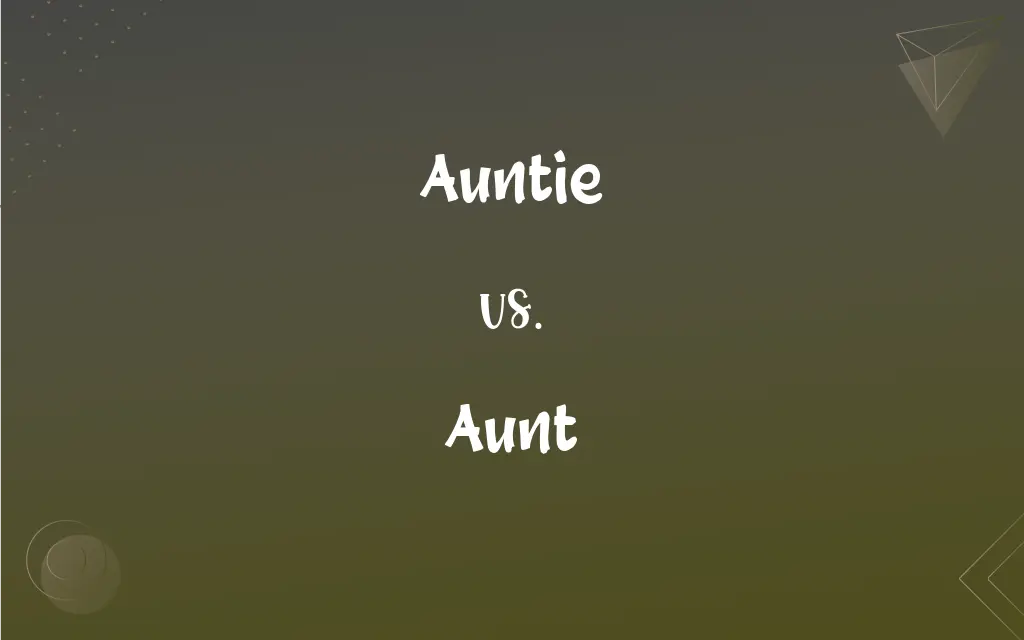Auntie vs. Aunt: What's the Difference?
Edited by Aimie Carlson || By Janet White || Updated on March 4, 2024
Auntie is an affectionate term for aunt, often used informally, while "aunt" is the formal term for a parent's sister or sister-in-law.

Key Differences
Auntie is commonly used in casual contexts or within families as a term of endearment. It conveys warmth and closeness, suggesting a friendly and affectionate relationship. On the other hand, "aunt" is the formal term used in both written and spoken English to refer to a parent's sister or sister-in-law, carrying a more neutral tone.
While "auntie" can also denote a woman of an older generation within a community, not necessarily related by blood, "aunt" specifically refers to a familial connection. This distinction highlights how "auntie" extends beyond biological ties to include honorary members of a family or community.
In many cultures, "auntie" is used as a respectful title for older women, irrespective of their relationship to the speaker, emphasizing respect and familiarity. Conversely, "aunt" is used more strictly to acknowledge a direct or marital familial relationship, without implying the same level of familiarity or affection.
The choice between "auntie" and "aunt" can also reflect cultural or regional preferences, with "auntie" being more prevalent in certain English-speaking regions. Whereas "aunt" is universally understood and used across various English-speaking cultures, indicating its formal and widespread acceptance.
Language evolution and social dynamics influence the preference for "auntie" over "aunt" in informal settings, illustrating how language adapts to social contexts. Meanwhile, "aunt" remains the standard term in more formal contexts, such as legal documents or when referring to the relationship in a more distant or respectful manner.
ADVERTISEMENT
Comparison Chart
Formality
Informal, affectionate term
Formal term
Usage Context
Casual, within families or communities
All contexts, including formal
Relationship Implication
Can imply closeness or honorary status
Specifically denotes a familial connection
Cultural Variance
More prevalent in certain cultures or regions
Universally recognized and used
Emotional Connotation
Conveys warmth and affection
Neutral, without inherent emotional connotation
ADVERTISEMENT
Auntie and Aunt Definitions
Auntie
Informally refers to a friend's parent or older woman.
Auntie Maria always makes the best cookies.
Aunt
A parent's sister or sister-in-law.
My aunt is coming to visit next month.
Auntie
Sometimes used to address older women in certain communities.
Hello, Auntie, how are you today?
Aunt
Refers to a specific familial relationship.
She is my father's youngest aunt.
Auntie
A term of endearment for an aunt or older woman.
I'm visiting my auntie this weekend.
Aunt
Used in formal and informal contexts.
Aunt Susan will be attending the ceremony.
Auntie
Used in some cultures for any respected older woman.
Auntie, could you please help me?
Aunt
Can be used in genealogy and family history.
I discovered a great-aunt I never knew about.
Auntie
Aunt.
Aunt
The sister of one's father or mother.
Auntie
Diminutive of aunt
Aunt
The wife of a sibling of one's mother or father.
Auntie
Term of familiarity or respect for a middle-aged or elderly woman.
Aunt
Used as a form of address for an older woman, especially by children.
Auntie
An elderly gay man.
Aunt
The sister or sister-in-law of one’s parent.
Auntie
To be or behave like the aunt of.
Aunt
The female cousin or cousin-in-law of one’s parent.
Auntie
A familiar name for an aunt. In the southern United States a familiar term applied to aged negro women.
Aunt
(affectionate) A woman of an older generation than oneself, especially a friend of one's parents, by means of fictive kin.
Auntie
The sister of your father or mother; the wife of your uncle
Aunt
(obsolete) Any elderly woman.
Auntie
Can signify a close, non-biological relationship.
She's not related, but I call her auntie.
Aunt
(obsolete) A procuress or bawd.
Aunt
The sister of one's father or mother; - correlative to nephew or niece. Also applied to an uncle's wife.
Aunt
An old woman; and old gossip.
Aunt
A bawd, or a prostitute.
Aunt
The sister of your father or mother; the wife of your uncle
Aunt
Often used in titles or when specifying family connections.
Aunt Emma, the family historian, shared some interesting stories.
FAQs
Are "auntie" and "aunt" interchangeable?
While they can be used similarly within families, "aunt" is more formal and universally applicable.
Does "auntie" imply a closer relationship than "aunt"?
"Auntie" often implies a more affectionate or close relationship, though it depends on individual and cultural contexts.
Is it disrespectful to call someone "auntie"?
It is usually seen as a sign of respect or affection, especially in cultures where it's customary, but context and personal preference matter.
How do I know whether to call someone "aunt" or "auntie"?
It often depends on personal preference, relationship closeness, and cultural or familial norms.
Can "aunt" also be used affectionately?
Yes, "aunt" can be used affectionately, but it is the formal term for this familial role.
Is "auntie" a proper term to use in formal writing?
"Auntie" is generally reserved for informal contexts, whereas "aunt" is preferred in formal writing.
Is the use of "auntie" limited to certain English-speaking regions?
Its usage is more common in some regions and cultures, reflecting local linguistic practices and norms.
Can "auntie" be used to refer to a friend's parent?
Yes, "auntie" can be used affectionately to refer to a friend's parent or an older woman in the community.
Can I use "auntie" for someone not related by blood?
Yes, "auntie" is frequently used for honorary aunts or respected older women in a community, not necessarily related by blood.
Why might someone prefer "aunt" over "auntie"?
Preferences may be based on formality, cultural norms, or simply personal choice.
Is there a difference in respect between calling someone "auntie" vs. "aunt"?
Respect can be conveyed with both terms, though "auntie" may also emphasize affection and closeness.
How do societal changes affect the use of "auntie" and "aunt"?
Societal changes can influence how these terms are used, reflecting shifting dynamics in family structures and cultural norms.
What is the significance of calling someone "auntie" in a community?
It often signifies respect, familiarity, and a close community bond.
Can "auntie" be considered more endearing than "aunt"?
Generally, "auntie" is considered more endearing due to its informal and affectionate use.
Can men be called "auntie" or "aunt" in any context?
Traditionally, these terms are gender-specific, referring to females, though cultural variations and contexts may differ.
Does the term "auntie" have different meanings in different cultures?
Yes, its connotations and usage can vary significantly across different cultures.
How do children typically refer to their aunts?
Children may use "auntie" or "aunt," influenced by familial preference and cultural norms.
How has the usage of "auntie" evolved over time?
Its usage has expanded in informal contexts, becoming more prevalent in certain cultures and communities.
Does the term "auntie" have an equivalent in other languages?
Many languages have equivalents that similarly blend familial roles with affectionate terms.
What are the implications of using "auntie" in a professional setting?
In professional settings, "aunt" is typically more appropriate, with "auntie" reserved for personal or informal interactions.
About Author
Written by
Janet WhiteJanet White has been an esteemed writer and blogger for Difference Wiki. Holding a Master's degree in Science and Medical Journalism from the prestigious Boston University, she has consistently demonstrated her expertise and passion for her field. When she's not immersed in her work, Janet relishes her time exercising, delving into a good book, and cherishing moments with friends and family.
Edited by
Aimie CarlsonAimie Carlson, holding a master's degree in English literature, is a fervent English language enthusiast. She lends her writing talents to Difference Wiki, a prominent website that specializes in comparisons, offering readers insightful analyses that both captivate and inform.































































